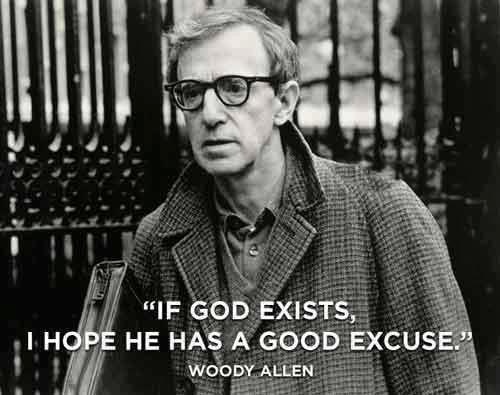Certainty is so often overrated. When the Most Rev. Justin Welby, the archbishop of Canterbury, said recently that at times he questioned if God was really there, much of the reaction was predictably juvenile: Even God’s earthly emissary isn’t sure if the whole thing is made up! The International Business Times called it “the doubt of the century.” Welby’s admission had not just “raised a few eyebrows,” it declared, but “sparked concerns if the leader of the Church of England would one day renounce Christianity or spirituality as a whole.” Another journalist wrote excitedly, “Atheism is on the rise and it appears as though even those at the top of the church are beginning to have doubts.”
 I learned long ago that it’s virtually impossible to have a rational, reasoned discussion about religion. There are few things that people cling to more vigorously than their faith, whatever it may be. Question that faith or, worse, belittle it, and what you’ll have on your hands is someone highly offended that you’d dare to (ridicule or) question the validity of their beliefs. When one builds their emotional house with faith as a foundational component, questioning the integrity of that foundation can be a recipe for anger and/or defensiveness. So many of those who hold tightly to their religious wouldn’t think of critically examining those beliefs…because doing so might just bring the very structure of their world into question. Beyond that, the very act of questioning- to whatever degree- is to admit their faith isn’t absolute and unshakeable.
I learned long ago that it’s virtually impossible to have a rational, reasoned discussion about religion. There are few things that people cling to more vigorously than their faith, whatever it may be. Question that faith or, worse, belittle it, and what you’ll have on your hands is someone highly offended that you’d dare to (ridicule or) question the validity of their beliefs. When one builds their emotional house with faith as a foundational component, questioning the integrity of that foundation can be a recipe for anger and/or defensiveness. So many of those who hold tightly to their religious wouldn’t think of critically examining those beliefs…because doing so might just bring the very structure of their world into question. Beyond that, the very act of questioning- to whatever degree- is to admit their faith isn’t absolute and unshakeable.
Doubt isn’t a recipe for emotional stability. Doubt means looking at something and wondering if it truly exists in the form we believe it to. Uncertainty can be unsettling, because it can mean closely examining and evaluating the underpinnings of what we’ve held to be true, in some cases for years, perhaps even most of our lives. If what we’ve believed to be true is in fact not…then what? What fills that void? How do we reconstruct the framework upon which we’ve built our spiritual life?
When a religious figure of significance admits to doubt and uncertainty, it triggers all manner of responses. If a man whose life and career has been predicated on living and serving their faith expresses uncertainty, it may not be reflective of questioning God’s existence. It may simply be a matter of a human being caught in the maelstrom of life’s tragedies and setbacks wondering what’s happening and why. It’s something any thinking human experiences during their life; most are simply loathe to admit to it.
Faith cannot block out darkness, or doubt. When on the cross, Jesus did not cry out “Here I come!” but “My God, why have you forsaken me?” His disciples brimmed with doubts and misgivings.
Just as courage is persisting in the face of fear, so faith is persisting in the presence of doubt. Faith becomes then a commitment, a practice and a pact that is usually sustained by belief. But doubt is not just a roiling, or a vulnerability; it can also be a strength. Doubt acknowledges our own limitations and confirms — or challenges — fundamental beliefs, and is not a detractor of belief but a crucial part of it.
As Bertrand Russell said, the problem with our world is that the stupid are irrevocably convinced while the intelligent are roiled with doubt and uncertainty. Doubt isn’t a character flaw; it’s not indicative of a personality unable to be decisive and certain. It’s the sign of an intellect that’s constantly questioning the status quo and accepted wisdom. Doubt means wondering, being curious and wondering if what’s considered common knowledge is in fact real and accurate. This is as true for the religious as it is for atheists. I don’t believe in God, but even I find myself not always altogether convinced. Sometimes events, setbacks, or disappointments leave me wondering about the grand scheme of things- as in, is there any? IS life just a collection of random events ending in death, or is there something- a thread, a governing philosophy- designed to tie it all together?
People of faith who admit to doubts are simply trying to wrap their heads around a concept difficult to comprehend under the best of circumstances. It’s not a “victory” for atheists any more than it’s a “defeat” for those who believe in God. As it was for the Archbishop of Canterbury, it’s a very personal journey deep into the innermost part of what makes us who we are. It’s not an “I win, you lose” proposition; it’s a thinking, human proposition. To question isn’t an expression of a lack of faith. Doubt isn’t about a lack of certainty. It’s about a thinking, feeling human being examining their world and the suppositions they’ve constructed it with.
Truly, the smart ones are always the ones riven with doubt. No wonder the dumb ones seem so much happier.
